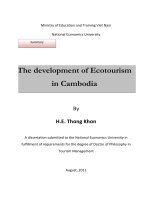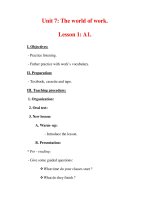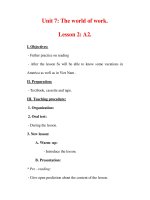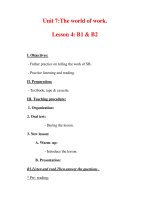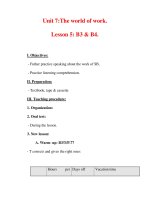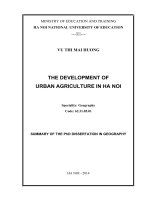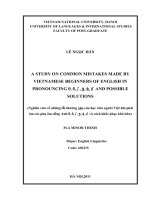TIỂU LUẬN LỊCH SỬ PHÁT TRIỂN TIẾNG ANH
Bạn đang xem bản rút gọn của tài liệu. Xem và tải ngay bản đầy đủ của tài liệu tại đây (540.36 KB, 13 trang )
HANOI OPEN UNIVERSITY
FACULTY OF ENGLISH
----
ASSIGNMENT ON THE HISTORY OF THE ENGLISH LANGUAGE
Supervisor: MA. VŨ TUẤN ANH
Hà Nội, 2020
MỤC LỤC
A. Question 1: What were the major external causes of the development of
American English? ......................................................................................................... 2
I. Introduction ........................................................................................................... 2
II. The main individualisms of American English ................................................ 2
2.1. The creativity of American English ................................................................ 2
2.2. American English is open and inclusive. ........................................................ 3
2.3.Resources of American vocablulary reflects the individualism of
American people...................................................................................................... 4
2.4. The wide usage of slangs ................................................................................. 4
III. The origination and development of American English ................................ 5
IV. Conclusion........................................................................................................... 6
V. References............................................................................................................. 6
B. Question 2: Based on what you know about the development of English from
its earliest inception, can you speculate on how the English language might
develop in the future? What kinds of changes might we expect to see and what
factors affect the extent to which you can make such predictions? ............................. 7
I. Introduction ........................................................................................................... 7
II. English in the furure ............................................................................................ 7
2.1.English as a lingua franca .............................................................................. 7
2.2. Some issues which need to be considered about the future of English ........ 9
2.3. Why english should be changed .................................................................... 10
III. Conclusion ........................................................................................................ 12
IV.References .......................................................................................................... 12
1
A. Question 1: What were the major external causes of the development of
American English?
I. Introduction
Based on the lasting prossperity
of American in aspects of
politics, economy, and culture,
together with its deep effects on
international society, American
English is punching the whole
world with different kinds of
methods. In our country, for a
long time English education
has been taking Britain English
as the learning standard,
students learnthe
Britain
English standard pronunciation. However, in recent years, American English is
affecting more
and more, large quantities of files anddocuments from
American teachers or schools
have proved this. Many scientific, economical
books are also written in English. To research a language, we should do know
its origination, because history molds and regulates language. This thesis tries to
analyze the external reasons for American English to be developed based on the
mainindividualisms of it.
II. The main individualisms of American English
2.1. The creativity of American English
American English maintained large quantities of special language that does now not
exist in Britain English. Compared to present standard Britain English, American
English can be ancient; its ancient property can be reflected in the usage of
characters. It maintained and refreshed some words that are not used in the present
Britain English. Some words are now not used in present standard Britain English,
but only limited to the local language, but in American English, they are still
common words. The sailor Columbus discovered this “new land”, with wide range
and sufficient material, the local people obey the racial traditions and culture, the
2
free and opened living environment molded American people as open minded and
smart, thus American English can als be imaginative. At that time, some Americans
thought that a new world can be craeated by combining the phonotactics with new
forms or just reform the letters. Thus they created many words that originally didn‟t
exist. As well, they also use prefixes and suffixes to create new words freely, which
to great extent completed the American English vocabulary.
2.2. American English is open and inclusive.
The sufficient new words that exist in American English mainly appear in the taking
of western boatmen, city entrepreneurs,
salesmen and expedition members. In the
whole colony period, the newly increased
American English words can be mainly
distributed into below 3 categories: The
words that absorbed from the Indian
language; The words of English
compounded words and the foreign words.
America is an opened country, English
itself is also maintaining great opening
property in its process of being developed and American English has bravely and
actively absorbed the words from other races based on inheriting Britain English
vocabulary while creating its own vocabulary . The foreign words melted into the
American peoples‟ oral language and written language, greatly amplified the
English language culture and prompted the cultural combination. From the fact that
American English wifely absorbs foreign words, we can see that American people
are always open-minded and dealing with concrete issues while compensating ther
weakness with th advantage from the exterior words. The members from emigrating
country would maintain less exclusive thoughts, they‟re worry to refuse outer
culture, this may be their strategies for actual development.
The French colonist have owned wide range of lands in North America; there are
27% in the most common 5000 words in American English from their own races,
17% of them from Latin language, 47% from French, and 9% from other languages.
Thus we can see that Freanch is also one of the main sources for American English
vocabulary. During the long-term communication of American English and
Germany, many Germany words are also absorbed. Every 4 of American people
there would be 1 Germany generation. Not less Germany culture individualisms
have become the common individualisms of American culture. In recent years,
3
China, have developed in aspects of economy, military, science and education, its
synthetic country power has also been developed a lot , that means China is
affecting greater and greater to each of the ares in the world, just like America,
become a big country that is enough to affect the whole world. The position of
Chinese language is also elecated obiviuosly, during the complicated
communication between America and China, their languages are also affecting each
other, and American English again has absorbed large quantities of words from
Chinese.
2.3.Resources of American vocablulary reflects the individualism of American
people
Rapidly developing American society tries to lead the people to search new words
about new things, new views and new minds with different kinds of modes. If there
aren‟t existing words, they would just create it. If there are existing words,
they would expand its sense. New words, new senses of American language
are the consequence of the development of the American society and the
combination of multi-culture, and this is the doomed consequent. The
apperance and common usage of new words also reflect the quality of being
good at innovation also shows that Americans are in favor of expedition.
They are used to creating, In their eyes, nothing is impossible. Only if you
can do it hard, you would succeed. There is a concept of “American dream”,
a kind of proud lead all the American people think that they can succeed
once they canpay a great effort. This individualism gives the American
people the habit to exaggerate in speaking, opposite to British people, who
are always controlling themselves and being gentle.
2.4. The wide usage of slangs
Slangs are from the common lives of people, which refect the actual life, it comes
from life but its conten is higher than life. Slangs are existing everywhere in the
social lives of American society, thus, we won‟t feel strange to list the slangs as one
of the individualisms of American English. Slangs aren‟t formal, not regulated
usually used oral language, limited only in special people group and occasions,
which is full of rhetoric, intelligence, humor, concise, vivid, new and fashion.
Slangs are from the low level of the society, to speak slangs can be a method to
release the presure of the mood. The present American society is giving great
pressure to the citizens; the present words are no longer enough for people to
express their new minds and new feelings. Slangs are usually used by the young
4
people, who are the representatives of new culture and the main body to use
language. American common people like to use phrases that are combined of 2 or 3
words, which can accurately and rapidly express their thoughts while being
understood. Although sometimes people may think it as the reflection of being lack
of senior education, and slangs have been considered as patent for the common
people, actually, the super statum American people would also use slang sometimes
just in order to add elements like humor,concise and strengthen their Scenes.
III. The origination and development of American English
In ancient times, English was brought in by the England colonists from Britain to
American mainland. The history of American English is close relationship with the
history of American colony history. In the erly 16th- 17th century, the Britain
puritans started a fierce religiuos deforming and innovation action. Following it was
persecuted cruelly by the Englan establishmentarian religion, thus part of the
puritans decided to move to North America. In September 1620, the famous puritan
leader
Leland
Bradford
recruited 102 people and landed a wooden sailing which was 180 tons in weight and
27 meters in length “ May-Flower” and stared their “Columbus typed” long
adventure. After longer than 2 months, “ May -Flower” reached the Cod Cape,
English was thus brought in to such a “ new plain” which is wide and rich in
materials. However, as the early contact with the local Indian people, the emigrants
felt more and more that they didn‟t have enough vocabulary to express the new
things that they have seen, the consequent is that they searched and created many
kinds of new vocabulary to describe the new and strange things in the
communication with the local Indian. Thus, to borrow words from the local Indians
became their best method to create new words. In the whole colonists period, the
5
emigrants mainly absorbed the new words about the nature, such as mountains,
rivers, lakes and so on. In more than 50 states in present American, there are at least
27 of them whose name came from the Indian language. Ever since the beginning of
the 17th century that the Britain puritans landed on the American plain, in a long
time, there weren‟t obivious difference from the American English inherited the
basic vocabulary and grammar structure from the Britain English. Before the
indepence, American was once the colony for England, France, Span and so on. The
foreign vocabulary that has entered American English couldn‟t be to much. After
the independence of America, especially in the expanding period, large quantities
of language of other races were absorbed in American English. After the year 1776
in which America independent, some American scholars began to xonsider the
location of American English, they thought that America should maintain the
language of its own. In the year 1806, Webster formally pointed out the name of
American English, this was considered as the important symbol for the fornation ò
American English. In the year 1828, Webster edited the America English big
dictionary, which formally and systematically fixed American English vocabulary‟s
fornation, senses and usages. Since then, in the world, there was the real concept of
American English. After the second World War, American fixed its relative top
position in the world in military, economy and science areas, American English, as
a kind of cultural output product in America, its efect and spreading range have also
deeply entered each angle of the whole world.
IV. Conclusion
Here, we can conclude that the external causes of the development of American
English can be classified into many aspects; the first is the Indian local environment
of the Indian language. This is the first element that affected the American English.
The second is the language from other countries, just like German, France, and
China. American people are always ready to imitate, learn from others and create
based on their present foundations, All these elements caused the great development
of the present American English.
V. References
1. Appel, R. & Muysken. Language Contact and Bilingualism [M]. London: Ed
ward Arnold Publishers Ltd, 1987
2. Baker,C. Key Issues in Bilingualism and Bilingual Education [M].England:
Multilingual Matters Ltd, 1998
6
3. Abe H., Wiseman (1983). A crosscultural confirmation of the dimension of intercultural effectiveness, Internati
onal Journal of Intercultural Relations
4. Arthur W.,Bennett M(1995), The International Assignee:The Relative Import
ance of Factors Perceived to Contribute to Success. Personnel Psychology
5. David S.Jackson. (2004) Popular American English
6. />
B. Question 2: Based on what you know about the development of English from
its earliest inception, can you speculate on how the English language might
develop in the future? What kinds of changes might we expect to see and what
factors affect the extent to which you can make such predictions?
I. Introduction
In the ongoing state of modern globalization, language has become a barrier that
cannot be ignored. At a point in recent history, some believed that Chinese might
become the language of the future, but today China exists as the world‟s largest
speaking English population. English communication is thriving with some of the
world‟s largest and most disruptive companies based in English-speaking countries,
so it is no surprise that international communication is highly dependent on English
being a common ground.
The aim of this paper is to attempt to predict what the English language will be like
in the future, discussing lexical, morphological, syntactical and phonological
change and to consider whether English will still be a global language by then.
II. English in the furure
2.1.English as a lingua franca
7
One way of predicting the future is to look back at the past. The global role English
plays today as a lingua franca – used as a means of communication by speakers of
different languages – has parallels in the Latin of pre-modern Europe.
Having been spread by the success of the Roman Empire, Classical Latin was kept
alive as a standard written medium throughout Europe long after the fall of Rome.
But the Vulgar Latin used in speech continued to change, forming new dialects,
which in time gave rise to the modern Romance languages: French, Spanish,
Portuguese, Romanian and Italian.
Similar developments may be traced today in the use of English around the globe,
especially in countries where it functions as a second language. New
“interlanguages” are emerging, in which features of English are mingled with those
of other native tongues and their pronunciations.
Despite the Singaporean government‟s attempts to promote the use of Standard
British English through the Speak Good English Movement, the mixed language
known as “Singlish” remains the variety spoken on the street and in the home.
Spanglish, a mixture of English and Spanish, is the native tongue of millions of
speakers in the United States, suggesting that this variety is emerging as a language
in its own right.
Meanwhile, the development of automatic translation software, such as Google
Translate, will come to replace English as the preferred means of communication
employed in the boardrooms of international corporations and government agencies.
So the future for English is one of multiple Englishes.
8
2.2. Some issues which need to be considered about the future of English
2.2.1. What is being lost?
In the 20th century, it was feared that English dialects were dying out with their
speakers. Projects such as the Survey of English Dialects (1950-61) were launched
at the time to collect and preserve endangered words before they were lost forever.
A similar study undertaken by the BBC‟s Voices Project in 2004 turned up a rich
range of local accents and regional terms which are available online, demonstrating
the vibrancy and longevity of dialect vocabulary.
But while numerous dialect words were collected for “young person in cheap trendy
clothes and jewellery” – pikey, charva, ned, scally – the word chav was found
throughout England, demonstrating how features of the Estuary English spoken in
the Greater London area are displacing local dialects, especially among younger
generations.
The turn of the 20th century was a period of regulation and fixity – the rules of
Standard English were established and codified in grammar books and in the New
(Oxford) English Dictionary on Historical Principles, published as a series of
volumes from 1884-1928. Today we are witnessing a process of de-standardisation,
and the emergence of competing norms of usage.
In the online world, attitudes to consistency and correctness are considerably more
relaxed: variant spellings are accepted and punctuation marks omitted, or
repurposed to convey a range of attitudes. Research has shown that in electronic
discourse exclamation marks can carry a range of exclamatory functions, including
apologising, challenging, thanking, agreeing, and showing solidarity.
Capital letters are used to show anger, misspellings convey humour and establish
group identity, and smiley-faces or emoticons express a range of reactions.
2.2.2. Getting shorter
Some have questioned whether the increasing development and adoption of emoji
pictograms, which allow speakers to communicate without the need for language,
mean that we will cease to communicate in English at all?
The fast-changing world of social media is also responsible for the coining and
spreading of neologisms, or “new words”. Recent updates to Oxford
9
Dictionaries give
aflavour: mansplaining, awesomesauce, rly, bants, TL;DR (too
long; didn‟t read).
Clipped forms, acronyms, blends and abbreviations have long been productive
methods of word formation in English (think of bus, smog and scuba) but the huge
increase in such coinages means that they will be far more prominent in the English
of the future.
2.3. Why english should be changed
Language is always changing, evolving, and adapting to the needs of its users. This
isn't a bad thing; if English hadn't changed since, say, 1950, we wouldn't have
words to refer to modems, fax machines, or cable TV. As long as the needs of
language users continue to change, so will the language. The change is so slow that
from year to year we hardly notice it, except to grumble every so often about the
„poor English‟ being used by the younger generation! However, reading
Shakespeare's writings from the sixteenth century can be difficult. If you go back a
couple more centuries, Chaucer's Canterbury Tales are very tough sledding, and if
you went back another 500 years to try to read Beowulf, it would be like reading a
different language.
Why does language change?
Language changes for several reasons. First, it changes because the needs of its
speakers change. New technologies, new products, and new experiences require
new words to refer to them clearly and efficiently. Consider texting: originally it
was called text messaging, because it allowed one person to send another text rather
than voice messages by phone. As that became more common, people began using
the shorter form text to refer to both the message and the process, as in I just got a
text or I'll text Sylvia right now.
10
Another reason for change is that no two people have had exactly the same
language experience. We all know a slightly different set of words and
constructions, depending on our age, job, education level, region of the country, and
so on. We pick up new words and phrases from all the different people we talk with,
and these combine to make something new and unlike any other person's particular
way of speaking. At the same time, various groups in society use language as a way
of marking their group identity; showing who is and isn't a member of the group.
Many of the changes that occur in language begin with teens and young adults. As
young people interact with others their own age, their language grows to include
words, phrases, and constructions that are different from those of the older
generation. Some have a short life span (heard groovy lately?), but others stick
around to affect the language as a whole.
We get new words from many different places. We borrow them from other
languages (sushi, chutzpah), we create them by shortening longer words (gym from
gymnasium) or by combining words (brunch from breakfast and lunch), and we
make them out of proper names (Levis, fahrenheit). Sometimes we even create a
new word by being wrong about the analysis of an existing word, like how the word
pea was created. Four hundred years ago, the word pease was used to refer to either
a single pea or a bunch of them, but over time, people assumed that pease was a
plural form, for which pea must be the singular. Therefore, a new word, pea, was
born. The same thing would happen if people began to think of the word cheese as
referring to more than one chee.
Word order also changes, though this process is much slower. Old English word
order was much more 'free' than that of Modern English, and even comparing the
Early Modern English of the King James Bible with today's English shows
differences in word order. For example, the King James Bible translates Matthew
6:28 as "Consider the lilies of the field, how they grow; they toil not." In a more
recent translation, the last phrase is translated as "they do not toil,” because English
no longer places not after the verb in a sentence.
The sounds of a language change over time, too. About 500 years ago, English
began to undergo a major change in the way its vowels were pronounced. Before
that, geese would have rhymed with today's pronunciation of face, while mice
would have rhymed with today's peace. However, a 'Great Vowel Shift' began to
occur, during which the ay sound (as in pay) changed to ee (as in fee) in all the
words containing it, while the ee sound changed to i (as in pie). Overall, seven
11
different vowel sounds were affected. If you've ever wondered why most other
European languages spell the sound ay with an „e‟ (as in fiancé), and the sound ee
with an „i‟ (as in aria), it's because those languages didn't undergo the Great Vowel
Shift, only English did.
III. Conclusion
In conclusion, barring a colossal political upheaval, English is likely to remain the
global language of the future. However, English will exist as WSSE and as dialect
variations. Hence, diglossia may become a means of survival by the future. As
there will be far more SL speakers than native English speakers in the future, the
latter will innovate change as a means of identity enactment. For written English,
„the tolerance spectrum‟ will need to be outlined and implemented by educational
institutions worldwide.
It is worthwhile remembering that „language functions in time, space and the social
dimension and changes according to its communicative roles‟ (Ureland, 1989: 243)
and all of these factors change over centuries, rather than decades.
IV.References
1. />_English_retain_its_current_global_position_in_the_next_50_years
2. />3. History of English, Dan Mclntyre, 1st edition.
4. The future of English, David Graddol.
5. />6. English as a global language – David Crystal
7. />
12
